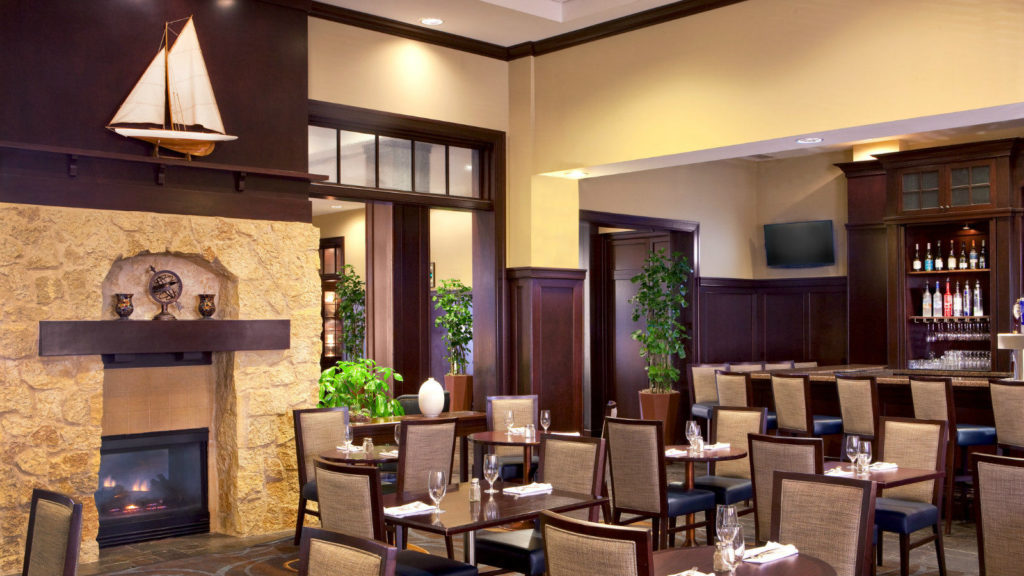This week, I had plans to fly from Miami to Baltimore, overnight in Baltimore and then continue on to Chicago for an event. While it was an odd routing, I had booked the tickets separately, and it made the most sense since the plane tickets were non-refundable.
In any event, I had booked the Sheraton BWI for the overnight stay, a hotel I had stayed at many times before. I arrived into Baltimore from Miami at around midnight and called the hotel for a shuttle pickup. While the shuttle was a bit slow to pickup and there was confusion over an identical bus heading to the Westin next door, I managed to get to the hotel around 12:45 or so.
At the hotel, a flight crew for United was on my shuttle, and I let them go first to check-in. They had keys pre-made at the front desk and signed a log sheet and took their keys without any employee interaction. After waiting a few moments, I was assisted at the counter, and I overheard another employee saying “I called down the street, and they’ve got rooms for us…” While I knew what he was referring to — the hotel being oversold — I assumed it would have no impact on me as an SPG Platinum, the highest tier at Starwood. The front desk clerk then said the dreaded words that I assumed she would have never said… “the hotel is oversold.” I was in disbelief. Not only did I have a confirmed reservation, but I confirmed with her that there were many guests who had checked in before me who were not Starwood elite members who had received rooms. While I don’t like to pull the “elite status card,” there are benefits to staying at a particular chain a lot, and one of them is protection when something goes wrong – or, in this case, protection from something going wrong. Normal policy would be to “walk” (the hotel industry term for sending a guest to another property) a non-elite member first, working up the chain, using an SPG Platinum as a last resort. After an exchange of words, I was given a piece of paper indicating I’d be staying at a hotel 4 miles away, not part of the Starwood brand as all of those hotels were fully booked. I had no choice, if I wanted a bed for the night. I asked for the General Manager’s card, and left my phone number and was told I’d receive a call first thing in the morning, which would be expected in a case like this.
I drove to the other hotel and checked in, and after dealing with a hotel employee there that clearly wasn’t enjoying her job, I got into my room. For the first several minutes of check-in there was confusion over the parking situation as I was being charged a daily rate for parking, where I wasn’t at the Sheraton. I called the Sheraton BWI for intervention and they spoke to the new hotel to arrange direct billing back to the Sheraton — a process that took several minutes to complete. For the purposes of this blog post, I’m going to not name the hotel I was sent to, as I don’t want to shift any blame to them as it was not their fault that I was appearing at their doorstep. What I will say, however, is that this hotel was a 2-star brand, which traditionally does not get any sort of high – or mediocre for that matter – marks in the travel industry. Let’s just say the hotel felt 2-star and had numerous cleanliness and mechanical issues, and was nowhere near what would be expected from staying at a Starwood property. I had called the Starwood Platinum line during the transition between hotels and was informed they couldn’t do anything more than open a case to investigate later.
The following morning I woke up and took my flight as anticipated, albeit with lost sleep as the room I was put in at the 2-star property had a non-central air/heating unit, forcing a constant stream of hot air with no way to automatically adjust the temperature.
It’s important to note that the stay at this other hotel was fully paid for, however a residual parking authorization was placed on my credit card, which was removed once I notified the Sheraton the next day.
As with any major service issue like the one I experience at the Sheraton, one would anticipate a call early the next morning from management apologizing, as was promised to me by the front desk staff. That call never came. Nothing. Nada. Zilch. I wrote the General Manager explaining my displeasure with the situation, and posted on social media several times asking for assistance from the Starwood Twitter team. Past 2pm EST, no call had still be received, so I sent a second follow up email to the GM asking why the delay – and several minutes later, I suddenly received a call, so appropriately timed to my follow up email. At this stage, the General Manager made several excuses for the situation at hand and didn’t begin the call with an apology, but rather several excuses as to why the oversell occurred. The call was disconnected shortly after.
Over the next few hours, I was able to speak to a senior manager at Starwood‘s customer care center, who called the hotel herself and found that the General Manager was meeting with her Vice President of Operations to discuss compensation. As was informed to me by the customer service associate, I was advised that the hotel did not follow policy in walking other guests prior to me, did not deny the flight crew rooms (I was surprised that apparently they receive lower priority than me as flight crew, to be honest…I figured their contract would trump my reservation, but according to what I was told, it didn’t). In any event, I was advised that they were meeting to discuss how to resolve, and that a follow up would be received before end of business day.
Fast forward a few hours, I had called Starwood again when no follow up from the hotel was received (a pattern that repeated itself…), and they managed to call the hotel to conference call the General Manager in. As a customer, I felt extraordinarily frustrated that not once throughout the day did the hotel proactively reach out — they only did so after contacting them several times or getting Starwood involved. You’d think that any sort of issue such as this would require some sort of immediate attention – if not by the GM, then by some sort of manager or even Starwood themselves. I was offered 25,000 points to close the case against the hotel, which by this stage I felt to be inappropriate.
- No immediate service recovery was done when I was walked, other than informing me of the other hotel being paid for.
- I had to contest parking charges on my credit card at the new hotel, that should never have been charged.
- The new hotel was of a lesser star rating than the hotel I had booked, and had numerous cleanliness issues. While those issues can’t necessarily be blamed on the Sheraton, they ultimately take responsibility since that was the hotel they were transferring me to.
- I did not receive a full night of sleep due to room issues at the new hotel. While again this isn’t necessarily the fault of the Sheraton, they take responsibility of issues at the new hotel regardless.
- I had to follow up with the hotel numerous times to receive a response. Every call is time, every email is time, and every missed contact is time re-spent attempting follow up.
- All in all, multiple hours were spent on the phone to seek resolution, which is time away from my day and other activities.
I wanted to highlight the failures above and beyond the “walking.” If the hotel had simply moved me to a comparable or better property, it alleviates a can of worms by sending someone to a lesser property. A simple apology early on in the process is necessary, with prompt reaching out to the guest – even a simple acknowledgement by email or phone that they’ve received the message and will be replying shortly (directly from the hotel) goes a long way. None of these were ever received, which is frustrating, especially for someone loyal to a brand such as Starwood.

While some may consider 25,000 points to be generous, take a look at Marriott’s “walking” policy, for example (as they now own SPG): For them, a Platinum walked from a hotel such as this receives a $100 check/cash-in-hand and 90,000 Marriott Rewards Points. Translating that to SPG terms, that would be a $100 check and 30,000 SPG points. SPG‘s policy is a bit more vague and doesn’t appear to be published anywhere public, but only requires points to be given up to the total of what the hotel is worth, multiplied by 2. Because this hotel was of such a low category, that only would have amounted to a very small amount of compensation. It’s odd to see such a large discrepancy. Because of the additional customer service issues I experienced, one would assume the more generous of the two policies would stand as a good guidance of what to seek as compensation. The big inconsistency with SPG is that if the hotel costs less on points to redeem at, their requirement for compensation is dramatically less, whereas Marriott’s requirement requires 90,000 of their points regardless – despite the instance of “walking” to be just as severe and inconveniencing, no matter the property or level.
If the hotel transferred me to a comparable property with an immediate offer of compensation, it goes a long way in helping a bad situation. It’s all about how the hotel handles it:
- Sending a guest to a comparable hotel, not a poorer one.
- Providing on the spot compensation or promise of compensation, with specific amounts.
- Promises for management to reach out by a certain time fulfilled.
- Callbacks promised following initial communication actually returned.
- Profuse apology from the beginning, rather than the possibility for excuses.
- Admission of fault right then and there at check-in, rather an “I’m not sure how this happened.”
In short, I was able to speak with the Vice President of the hotel’s local management company who defended the hotel’s attempt at resolution. Starwood advised they couldn’t do any more as it was in the hotel’s hands, and cases like this are “owned” by the hotel. While no further compensation was offered, I was able to gain insight from several SPG representatives and other elite members I had spoken with that:
- Walking a Platinum from a hotel is extremely rare. In fact, none of the SPG representatives I had spoken with had experienced such a thing before.
- Many believed 25,000 points to not be entirely fair to the situation at hand, especially with Marriott’s offering to be far more generous on the base level (again, they aren’t SPG at this time, however I think it’s a fair comparison as they now own Starwood), not including the issues at the other property.
- Some felt 25,000 points to be enough, so long as the exchange between properties was even (3 star to 3 star, SPG to SPG, etc.).
- The delayed response from the hotel was highly unusual.
- One SPG representative had to emphasize to the hotel the necessity for compensation, as it appeared there was some hesitancy or unwillingness, as defined by their lack of response.
Many will say their compensation is fair, and to that, I respect that opinion. That said, I believe there’s more to the circumstances and that the situation was less cut and dry like most hotel service issues.
I think this was an extraordinarily unique case – both with the property transferring me to a poorer hotel, the lack of response from hotel management, hotel management initially providing excuses for the incident, and also the lack of understanding of how much time was spent to seek a resolution. I still do not feel the hotel handled this appropriately, however wanted to write this story up to share with others who may face themselves in a similar situation (God forbid…).



 Jamie Larounis is an avid traveler, blogger and miles/points educator. Traveling well over 100,000 miles a year and staying in hotels for over 100 nights, he leverages miles, points and other deals to fly in first class cabins, and stay in 5-star hotels. The Forward Cabin shares his experiences, musings, reviews, tips, tricks, resources and industry news with you, the fellow traveler.
Jamie Larounis is an avid traveler, blogger and miles/points educator. Traveling well over 100,000 miles a year and staying in hotels for over 100 nights, he leverages miles, points and other deals to fly in first class cabins, and stay in 5-star hotels. The Forward Cabin shares his experiences, musings, reviews, tips, tricks, resources and industry news with you, the fellow traveler.